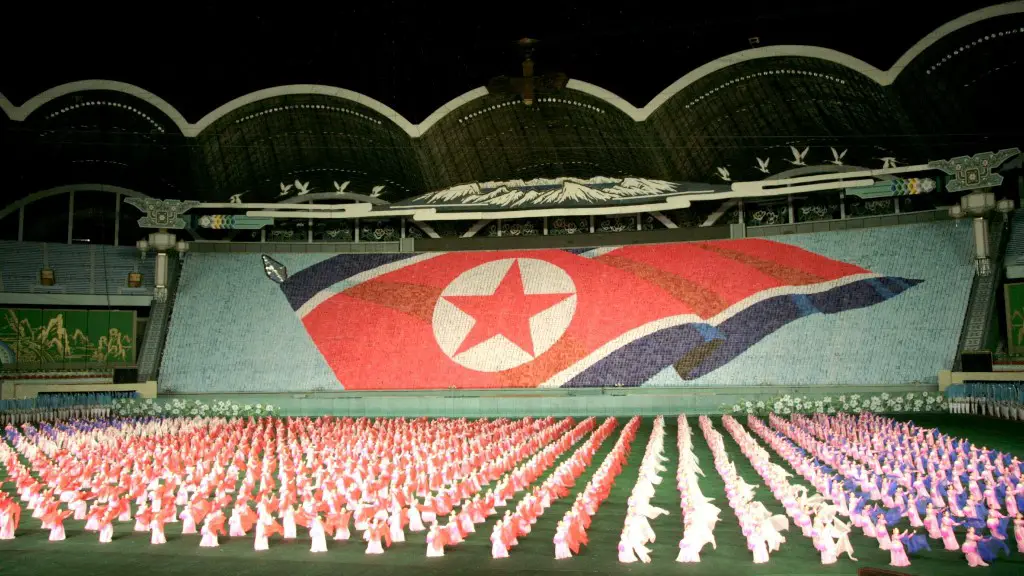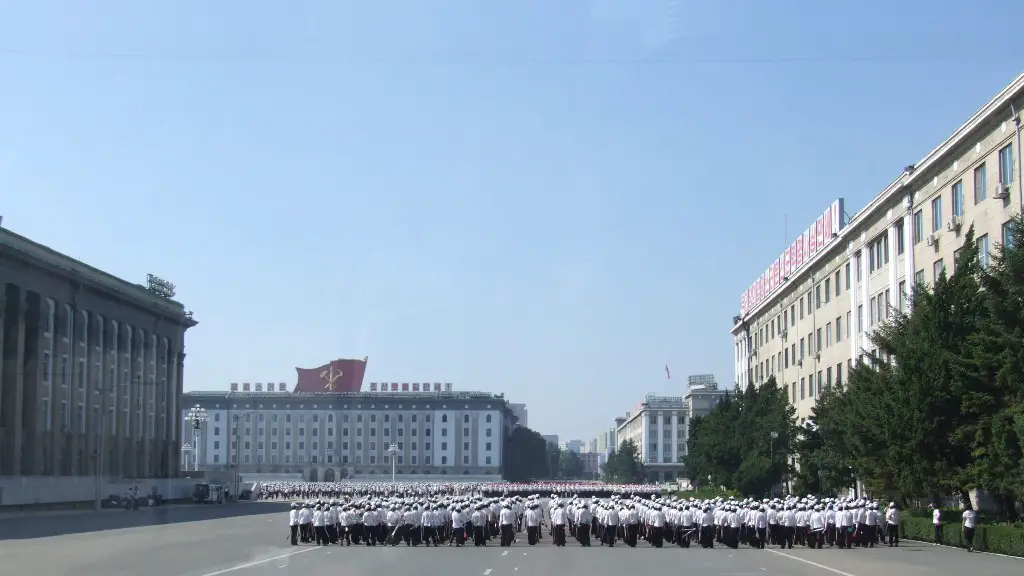When it comes to the question of whether or not the United States would nuke North Korea, there is no single definitive answer. There are a number of factors at play, both in terms of foreign policy and public opinion, that make it difficult to arrive at a decisive answer. This article will explore the pros and cons of the US taking such drastic action, considering the potential effects on geopolitics and world security.
The main point of contention between the two countries is North Korea’s weapons of mass destruction (WMD) program, which has posed a serious threat to stability in the region. The US and its allies have continually pushed for denuclearization of the Korean peninsula, yet North Korea has consistently refused these demands. This has pushed the two sides to heated confrontations and diplomatic standoffs, and the US has often resorted to imposing economic sanctions as a way of influencing North Korean policy.
On one hand, some experts argue that a preemptive nuclear strike against North Korea could be a viable option to prevent further aggression, while averting an imminent nuclear conflict. According to this line of thinking, a limited nuclear strike, precisely targeted at key military and WMD sites, could be the only way to deter North Korea from utilizing their arsenal.
On the other hand, there are counterarguments that suggest that a nuclear strike against North Korea could have catastrophic consequences for both countries. Proponents of this school of thought warn of the potential for severe retaliation from Pyongyang, along with the chance of a devastating arms race in the region. In addition, such a decision could also spark a humanitarian crisis, as millions of innocent civilians would have to bear the brunt of the consequences.
Ultimately, the decision to deploy nuclear weapons against North Korea would depend on a range of factors. Recent developments have shown that diplomatic negotiations, along with economic and political pressure, may still be able to resolve the current standoff. However, if North Korea refuses to comply and continues to pose a serious threat to global security, then a preemptive nuclear strike could be one of the few options left on the table.
Impact on US-China Relations
Despite the potential benefits of a US nuclear strike against North Korea, there are also serious implications for US-China relations. The two countries have long been at odds over the North Korean crisis, with China advocating dialogue and peaceful resolution, while the US has historically favored a policy of confrontation and pressure. Any nuclear strike against North Korea could be seen as a direct challenge to China’s interests, leading to a further deterioration in their already strained relationship.
In addition, China has traditionally been one of North Korea’s closest allies, providing economic and political support in times of crisis. This could lead to heightened tensions between the two countries, as China could retaliate by cutting off economic ties or punishing the US through other means. This could further escalate the crisis and increase the risk of a major conflict.
In light of these issues, it is clear that any decision by the US to use nuclear weapons against North Korea would be a serious gamble. While it may be effective in deterring further aggression, it could also lead to a host of unintended consequences, making it an unappealing option for US foreign policy.
Opposition to Nuclear Strike
Aside from the potential geopolitical implications, there is also strong public opposition to the US using nuclear weapons against North Korea. Many Americans are wary of the idea of a nuclear strike, as they fear the potential risks involved, such as the threat of escalation, mass casualties, and environmental damage. Polls have consistently shown that a majority of Americans are against a nuclear strike against North Korea, with some surveys indicating that support is as low as 15%.
In addition, a nuclear strike could be considered a violation of international law. The Treaty on the Non-Proliferation of Nuclear Weapons, which was signed by the US and other world powers in 1968, forbids the use of nuclear weapons “in any circumstance”. Though the US has justified its past use of nuclear weapons as a necessary measure to protect its citizens, any preemptive nuclear attack against North Korea would be difficult to justify in the eyes of the international community.
Finally, the decision to use nuclear weapons against North Korea might also have a detrimental impact on US-led efforts to denuclearize the Korean peninsula. By launching a nuclear attack against North Korea, the US would be sending a clear message to its allies in the region that it is willing to use weapons of mass destruction to resolve conflicts. This could further complicate ongoing diplomatic efforts and undermine the US’s efforts to maintain the region’s stability.
International Reactions to Nuclear Strike
While the US may be the only country in the world with the capability to launch a nuclear strike against North Korea, it would still need the approval of the United Nations Security Council in order to do so. This would almost certainly require a resolution from the Council’s five permanent members – the US, China, Russia, the UK, and France – as well as other non-permanent members.
Given the potential ramifications of a US nuclear strike against North Korea, it is likely that many countries would oppose the idea. It is easy to imagine a scenario in which China and Russia, two of North Korea’s closest allies, might refuse to approve the resolution. Similarly, diplomatic allies of the US such as the UK and South Korea could also oppose the idea, making it unlikely that the resolution would pass the Council.
Furthermore, even if the resolution were to pass, it is possible that the US would still face considerable international condemnations. Countries from around the world, particularly those from the non-aligned movement, could rally together to protest against such a unilateral action, further isolating the US from the international community.
Averting Nuclear Conflict
Despite the complex issues surrounding the question of whether or not the US should nuke North Korea, there is still the potential for a peaceful resolution. The US and its allies have already shown that diplomatic pressure, along with economic and political sanctions, can be effective in influencing North Korean policy. As such, these methods should be used before resorting to more drastic measures.
The US also needs to ensure that it maintains open lines of communication with North Korea, as this could help ease tensions and make a diplomatic solution more likely. There have already been some encouraging signs of progress on this front, with the two sides having met for several rounds of talks in recent months. Going forward, it is essential that both countries remain committed to their dialogue, in order to avoid catastrophe and pave the way for a peaceful agreement.
Finally, it is important for the US and its allies to continue to press for denuclearization of the Korean peninsula. The Trump administration’s “maximum pressure” strategy has been effective in curbing Pyongyang’s nuclear ambitions, and this needs to continue if there is to be any hope of avoiding a catastrophic conflict.
International Sanctions
In addition to diplomatic dialogue, the US and its allies should continue to impose economic and political sanctions on North Korea, in order to force Pyongyang to reconsider its WMD program. Sanctions have been an effective tool in the past, and their continued use could lead to further progress in the ongoing dialogue.
The US also needs to continue to work with its allies in the region, in order to ensure that the sanctions are effective. China and Russia, in particular, play a key role in enforcing the international sanctions regime, and their continued support is essential for any progress to be made. The US needs to maintain open lines of communication with these countries, and cooperate with their efforts to put pressure on North Korea.
The goal of the international sanctions is to bring about a peaceful resolution to the North Korean crisis. While crippling sanctions can be detrimental to the country’s economy, they are a necessary tool in order to force Pyongyang to reconsider its WMD program. Going forward, it is essential that the US and its allies continue to cooperate in order to ensure the effectiveness of the sanctions and ultimately achieve the denuclearization of the Korean peninsula.
Economic Consequences
Finally, it is important to consider how a US nuclear strike against North Korea might affect the economy of the region. A military conflict, particularly one involving nuclear weapons, is likely to have a devastating impact on economies in the region. Already fragile economies such as those in South Korea and Japan could suffer major losses, leading to a prolonged period of economic instability.
Furthermore, a US nuclear strike against North Korea could also weaken the US’s standing in the world economy. International investors could be scared off by the prospect of a major military conflict in the region, leading to a decrease in foreign investments and a decrease in the value of the US dollar. Ultimately, this could limit the US’s economic power in the future.
In light of these issues, it is clear that any decision by the US to use nuclear weapons against North Korea must be carefully considered. Not only could it have devastating consequences for both countries, but it could also threaten the economic security of the region and weaken the US’s standing in the international economy.





